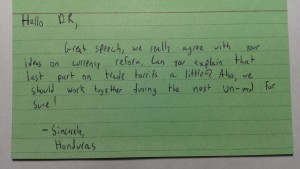Writing notes is one of the most tedious but rewarding parts of any MUN committee. Notes allow you to communicate with other delegates regardless of the size of your room, help you form alliances, work on resolutions, and even help you make friends. Regardless of how useful notes can be in a committee, it’s necessary to use them wisely and effectively. Here are a few tips for writing effective notes:
Always start with a greeting: Regardless of who you’re sending the note to, always precede it with some sort of a greeting. Usually, if sending a note in the first committee session, or to someone new, start with a greeting like “Hello,” or sometimes even “Dear”. As the conference progresses, you’ll probably be close with some of your fellow delegates, and it is okay to start using a greeting like “Hey” or “Hi”.
Be Friendly: Always use your notes for positive reasons, but never to put down someone’s policy or to say that someone is incorrect about something. Notes exist to make allies, not enemies, and writing negative notes can ruin the whole diplomatic concept of Model UN. It’s perfectly fine to ask questions about something someone said in committee, as long as you don’t write it sarcastically or with an ill-mannered tone. It’s even alright to politely write that you disagree with something, as long as you provide some sort of middle ground where you can meet. Do not send notes just to point out problems, always make sure you include a solution.
Keep it short: Unless you’re in a double delegation, sending notes is going to be very time consuming for you, and they may be even a huge distraction from the actual debate. Knowing this, it is important to keep your notes short, with minimal fluff. The goal of a note is not to be for casual conversation, but to be a medium for short communication between un-moderated caucuses. They give you the option to send a few points, and then quickly resume participation in debate.
Try to keep them neat: While many delegates will just use a ripped piece of paper for notes, it’s always nicer to use a post-it note or an index card. Not just because it looks nice, but mainly because it makes you look professional and will thus increase the chances of the person working with you. Also, it is recommended you write in print not script, mainly because it makes the note much more legible.
Keep them appropriate: This cannot be stressed enough, mainly because inappropriate notes can make the whole committee suffer. Notes should be solely about the debate in committee, and talking about personal matters (yes, that includes the dance) can jeopardize the ability to send notes for the entire committee. Most chairs will contact your adviser if you’re caught sending inappropriate notes or notes completely unrelated to committee. However, if on the last session your chair permits you to send comedy notes and you know committee is definitely over, go for it, just make sure they’re appropriate.
The format I like to use is typically along the lines of:
Greeting (Hello, Dear, etc.) Country Name,
A few bullet points or sentences either answering a question, asking a question, or complimenting a fellow delegate. Try to end with some sort of call such as “Would you like to work together?” or “Let me know if you have any other questions.”
Farewell (Thank You, Best, etc.),
Your Country Name


